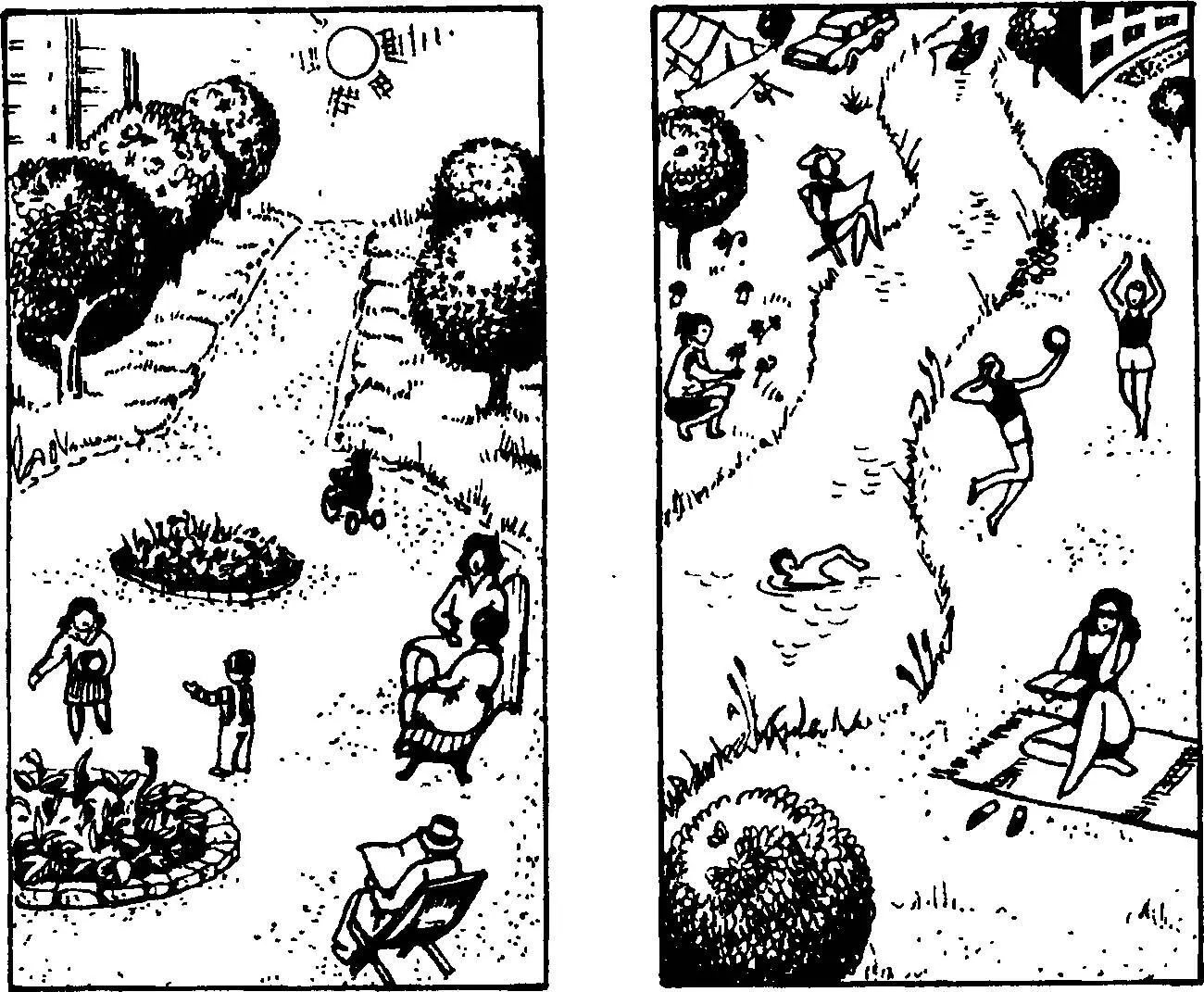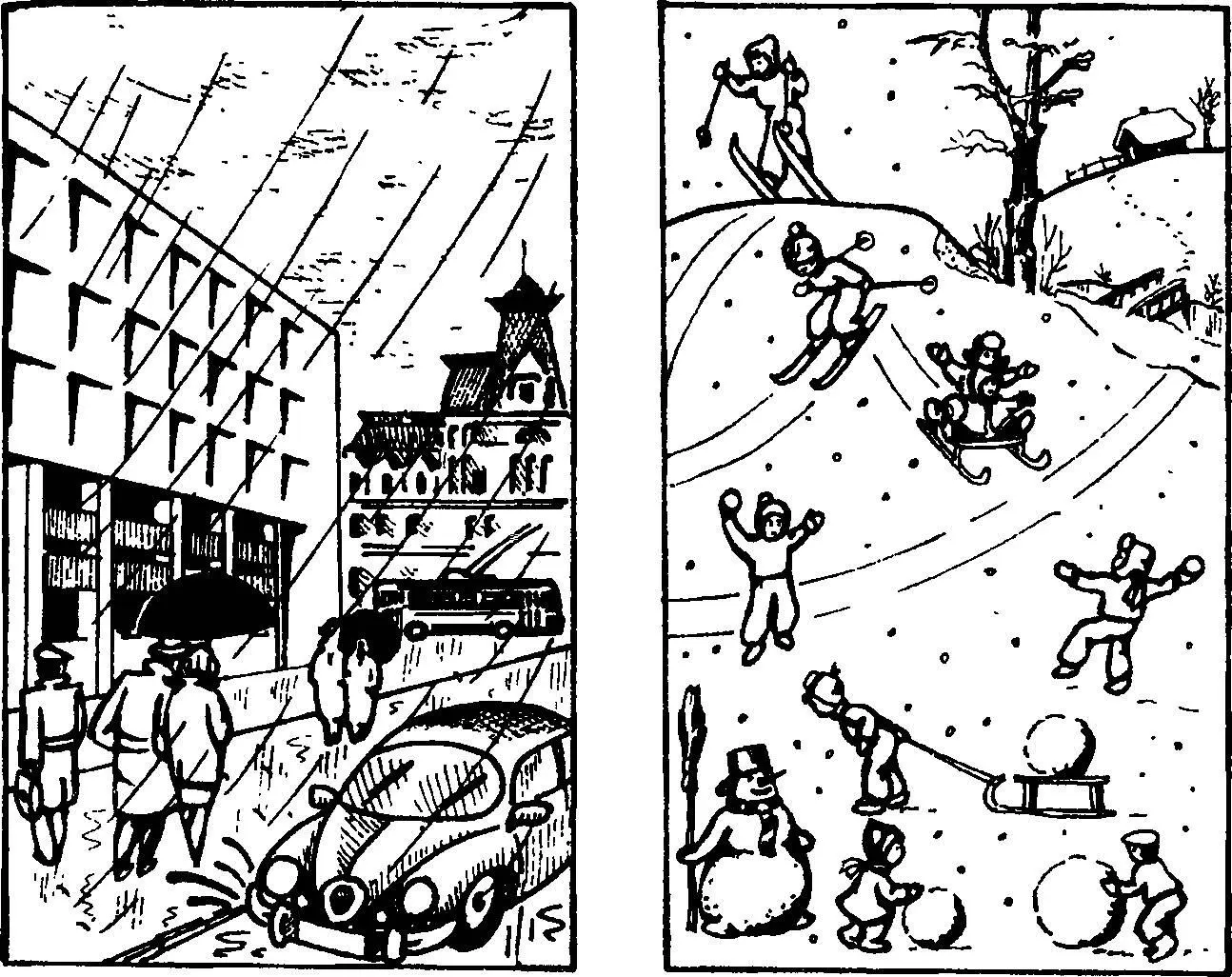Владимир Аракин - Практический курс английского языка 1 курс
- Название:Практический курс английского языка 1 курс
- Автор:
- Жанр:
- Издательство:ВЛАДОС
- Год:1998
- ISBN:нет данных
- Рейтинг:
- Избранное:Добавить в избранное
-
Отзывы:
-
Ваша оценка:
Владимир Аракин - Практический курс английского языка 1 курс краткое содержание
I - V курсов педагогических вузов.
Цель учебника – обучение устной речи на основе развития необходимых автоматизированных речевых навыков, развитие техники чтения, а также навыков письменной речи.
Практический курс английского языка 1 курс - читать онлайн бесплатно полную версию (весь текст целиком)
Интервал:
Закладка:
animal
hardly adv с трудом, едва, е. д. I could hardly understand her.
hard adv сильно; Syn. heavily, e. g. It is raining hard (heavily), hard adj
сильный, as a hard frost
frost л мороз; frosty adj морозный; freeze (froze, frozen) vt замерзать,
покрываться льдом; е. д. It's freezing hard.
sparkle vi сверкать; Syn. shine
icicle n сосулька
slide (slidr slid) vi/t скользить; кататься no льду thaw n
оттепель
float vi/1 плыть (по течению, по воздуху), e. g. A lot of red and green balloons
floated in the air.
harvest n жатва, уборка хлеба; урожай
degree л градус, е. д. We had 25 degrees above (below) zero yesterday.
close adj душный, e. g. Open the window. It's very close here Syn. stuffy
breathл дыхание; зд. дуновение, е. g. At last we felt a breath of fresh air;
breathe vt/i дышать, e. g. The childwas breathing hard, weather-forecastл
прогноз погоды
202
remainvi оставаться, е. д. In England the fields and the parks remain green
even in winter; Syn. stay
drizzleл мелкий дождь, изморось; drizzle vi, е. д. It's drizzling,
thunderstormл гроза; thunderл гром; a clap of thunderудар
грома
overcast adj покрытый облаками; хмурый (о небе)
pour vt/i лить, литься; наливать, е. д. It's pouring, Льет дождь.
Pour yourself a cup of milk.
fortunately adv к счастью; Ant. unfortunately tremendous adj страшный,
громадный; Syn. awful, terrible lightningл молния, е. д. A flash of lightning lit
up the sky. worth predic. adj заслуживающий, стоящий; to be worth doing
smth.,e. g. It's not worth thinking about.
TOPICAL VOCABULARY
season, to shine brightly; to be out-of-doors; to be in blossom (to be in bloom);
flower-bed; to cycle; to boat; to fish; to go cycling (boating, fishing); to bathe, to
swim; to lie in the sun; to play with a ball; to play tennis (football); to play a game
of chess (tennis); to pick flowers, to pick (gather) berries and mushrooms; to
travel by car; at the seaside; on the beach; on the bank of the
river
' ifiWviS
to blow; to go skating; skating-rink; to toboggan; fraifes of
snow; sleet; sledge; slush; to get wet through; melt
CONVERSATIONAL PHRASES
Weather remarks: What a marvellous (shocking) day! It seems to be getting
more settled (clearing up), doesn't it? It's very windy (mild, wet, stormy) today. I'll
be glad when the rain's over (the fog's cleared), won't you? It's nice (cold, warm,
chilly, hot), isn't it?
Hesitation devices: um, er, well, actually, in fact, you see, you know, the
thing is, it's like this, how shall I put it, thee (lengthening of the), ayyy
(lengthening of a), tooo (lengthening of to), I think..., I believe I suppose.
Memory Work:
When the weather is wet We must not fret, —
When the weather is cold We must not scold.
When the weather is warm We must not storm, —
But be thankful together Whatever the weather.
203
EXERCISES
I. a) The material below is to be prepared for reading. Mark the stresses and tunes.
Concentrate your attention on sounds, b) Let your fellow-student read the sentences for
you to detect his errors in sounds and tell him what must be done to eliminate them:
[e] 1. Get ten eggs ready for breakfast.
2. Every day in every way.
The weather is getting better and better.
3. East or West home is best.
4. All is well that ends well.
5. Better late than never.
6. Health is above wealth.
II. Before you start working at the texts practise the sounds in the following word
combinations from the texts:
A.
1. [rj] raining a little, wearing a mackintosh, carrying an
umbrella, spreading over London, floating across the sky, having a flight;
2. [ 3:J their first words, almost certain, the other person,
turned ripe;
3. [зи — э: — D] almost, can only crawl along, the ponds
are frozen over, a fight with snowballs.
B.1. Alveolars replaced by dentals: read the weather-fore-
cast, and the sun, but the English, about the weather, look at this.
2. Nasal plosion: it must be, it never, let me, like it now.
3. Loss of plosion: must be, what does it, but bright, spread to, it pours.
III. 1. a) Listen to the recording of the text "Seasons and Weather**.
Mark the stresses and tunes, b) Practise the text for test reading. Listen
to it carefully until you can say it in exactly the same way.
2. a) Listen to the dialogue. Mark the stresses and tunes, b) Practise the dialogue for
test reading. Listen to it very carefully until you can say it in exactly the same way. c)
Memorize and dramatize it.
IV.
Copy out of Text 1 all the words with digraphs ai, ei, ее, oo,
ow and transcribe them.
V. Give the four forms of the following verbs:
come, blow, drive, fall, prefer, freeze, ski, put, sweep, hang, show, sew, awake,
sleep, build, stop, sit, read, write, play, leave, begin, become.
VI.
Give the degrees of comparison of the following adjectives and transcribe them:
204
dark, heavy, hard, large, old, severe, pleasant, bad, good, strong, weak, little,
far, near, late, clear, hot, warm, beautiful.
VII. Ask questions covering the contents of Text 1 for your fellow-students to answer
them.
VIII. Look at the picture (p. 224) and answer the following questions:
1. Which of the four seasons is it? 2. Is the sky overcast with heavy clouds or
is it clear and bright? 3. Has the sun gone in or is it shining brightly? 4. What is
the ground covered with? 5. Are the fruit trees in blossom? 6. Do you see any
flower-beds in the picture? 7. Who do you see in the picture? 8. What are the
grown-up people doing? 9. What are the children doing? 10. Do people stay at
home in spring or do they prefer to go out into the garden? 11. How do you like to
spend your time m spring?
IX.
Look at the right-hand picture and ask one another questions
using the words and word combinations given below:
season; summer; hot, cold; the sun; to shine brightly; on the bank of the river;
to bathe, to swim; to boat, to fish (to go boating, to go fishing); to lie in the sun
(on the sand); to pick flowers; to pick (to gather) berries? and mushrooms; in the
woods; to spend one's vacation (holiday) at the seaside; to travel by car; to go
cycling; in a rest-home; on the shore.
205

X. Describe the picture (p. 225) using the following words and word
combinations: <
autumn; weather; nasty; the sky; to be overcast; cold, wind, to blow; low
clouds, to drive across the sky; to rain heavily (hard); to hurry along the streets; to
wear raincoats; to carry an umbrella; to get wet through; cars, trolley-buses, buses;
to go (run) along the streets; to splash; mud; passers-by.
XI.
Look at the right-hand picture and make up a dialogue. Use the Topical
Vocabulary, Conversational Phrases and Hesitation Devices.
XI.
a) Make the following sentences interrogative and negative:
1. It is as chilly today as it was yesterday. 2. The frost will be as hard
tomorrow as it is today 3. She is as fond of frosty weather as her brother is. 4. It
has stopped raining. 5. She will be working when you come. 6. Pressure will
remain high.
206

b) Ask one another questions on the fol owing sentences and answer them in the
negative. Add a sentence or two to develop a situation. Use conversational phrases:
1. It's coming on to pour. 2. There was a good fall of snow yesterday. 3. It's
still freezing hard. 4. The rain fell heavily last night. 5. It was foggy yesterday
morning. 6. It's clearing up. 7. The clouds are lifting. 8. I've got my folding
umbrella with me. 9. A thunderstorm is coming. 10. I've just read the weather-
Читать дальшеИнтервал:
Закладка:





![Владимир Аракин - Практический курс английского языка 3 курс [calibre 2.43.0]](/books/1072035/vladimir-arakin-prakticheskij-kurs-anglijskogo-yazyk.webp)




